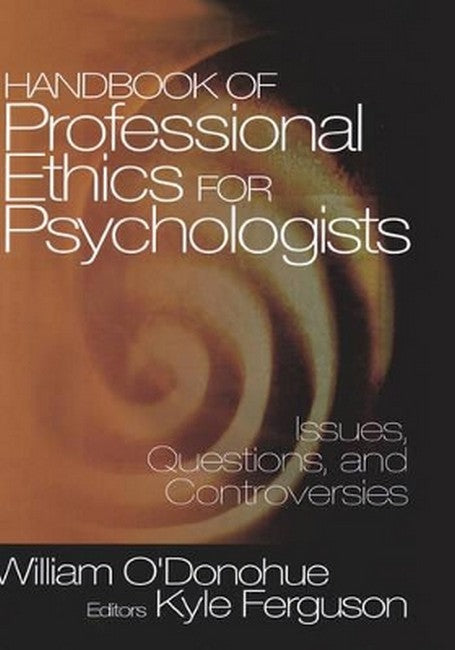William T. O'Donohue is a licensed clinical psychologist, professor of psychology and adjunct professor in the Department of Philosophy at University of Nevada, Reno, and a faculty member of the National Judicial College. He is widely recognized in the field for his proposed innovations in mental health service delivery, in treatment design and evaluation, and in knowledge of empirically supported cognitive behavioral therapies. He is a member of the Association for the Advancement for Behavior Therapy and served on the Board of Directors of this organization. Dr. O'Donohue has published over 50 books and 150 articles in scholarly journals and book chapters. For the past 14 years, he has been director of a free clinic that treats children who have been sexually abused and adults who have been sexually assaulted. Kyle E. Ferguson is pursuing his Ph.D. in psychology at the University of Nevada, Reno. He received a master's degree in behavior analysis from Southern Illinois University and a bachelor's degree from the University of Alberta. He coauthored a previous book, Working Through Anger, and two manuals, Working Through Anger: Therapist's Manual and A Practitioner's Guide to Behavioral-Medical Interventions. He coauthored the recent Sage book, The Psychology of B.F. Skinner (2001) with William O'Donohue.
Request Academic Copy
Please copy the ISBN for submitting review copy form
Description
Preface 1. Introduction: Ethics: The Good, the Bad, and the Ugly - William T. O'Donohue & Kyle E Ferguson (both of University of Nevada, Reno) PART I. FOUNDATIONS 2. Philosophical Foundations of Professional Ethics - Andrew Lloyd & John Hansen (both of University of Nevada, Reno) 3. Moral Reasoning - Karl H. Henning (St. Francis Xavier University) Karl H. Henning (St. Francis Xavier University) Karl H. Henning (St. Francis Xavier University) Karl H. Henning (St. Francis Xavier University) PART II. PSYCHOLOGY & PROFESSIONAL ETHICS 4. Ethical Principles of the Psychology Profession & Professional Competence - Ype H. Poortinga (Tilburg University & Catholic University of Leuven) & Karel A. Soudijn (Tilburg University) 5. The Mismeasure of Psychologists: A Review of the Psychometrics of Licensing Requirements - William T. O'Donohue & Jeffrey A. Buchanan (both of University of Nevada, Reno) 6. Institutional Review Boards: Balancing Conflicting Values in Research - Gregory J. Hayes (University of Nevada, Reno) PART III. SPECIAL TOPICS 7. Ethics and the Allocation of Healthcare - Nicholas A. Cummings (The Nicholas and Dorothy Cummings Foundation) 8. Fees and Financial Arrangements - Robert Miranda, Jr. (Brown University) & Brian P. Marx (Oklahoma State University) 9. The Termination & Referral of Clients - Natalie M. Rice & Victoria M. Follette (both of University of Nevada, Reno) 10. Ethical Principles of the Psychology Profession and Involuntary Commitment - Derek Truscott & Lori Goodkey (both of University of Alberta) 11. Ethics of Multiple & Overlapping Relationships - Janet Schank (Wilder Foundation Community Assistance Program) and Rachel Slater, Devjani Banerjee-Stevens, & Thomas M. Skovholt (all of University of Minnesota) 12. Ideals & Realities in the Development & Practice of Informed Consent - William C. Follette, Deborah Davis, Markus Kemmelmeier (all of University of Nevada, Reno) 13. Seven "Sins" of Misdirection? Ethical Controversies Surrounding the Use of Deception in Research - Markus Kemmelmeier, Deborah Davis, & William C. Follette (all of University of Nevada, Reno) 14. Confronting the Ethical Issues in the Use of Animals in Biomedical & Behavioral Research: The Search for Principles - John P. Gluck, Jordan B. Bell, & Melody Pearson-Bish (all of University of New Mexico) 15. Ethical Considerations in Psychological Assessment - Henry E. Adams (deceased) & Kristen A. Luscher (both of University of Georgia) PART IV. SPECIAL POPULATIONS 16. Confidentiality in Psychotherapy and Related Contexts - Nancy E. Tribbensee, Charles D. Claiborn (both of Arizona State University) 17. Ethical Principles of the Psychology Profession & Ethnic Minority Issues - Gordon C. Nagayama Hall (University of Oregon), Gayle Y. Iwamasa (University of Indianapolis), & Jessica N. Smith (University of Oregon) 18. Sexual Orientation & Professional Ethics - David W. Purcell, Stephanie Swann, & Sarah H. Herbert 19. Ethical Issues for Psychologists Working with Persons with Developmental Disabilities - W. Lawrence Williams & Kevin D. Williams (both of University of Nevada, Reno) 20. Ethical Principles of the Psychology Profession and Correctional Psychology - Linda E. Weinberger & Shoba Sreenivasan (both of University of Southern California) 21. The Central Role of Informed Consent in Ethical Treatment & Research with Children - David F. Richards (University of Nevada, Reno) 22. Ethical Principles & Practice in Couple & Family Therapy - Steven R. Thorp (Duke University Medical Center) & Alan E. Fruzzetti (University of Nevada, Reno) 23. Ethics and the School Psychologist - Susan Jacob-Timm (Central Michigan University) 24. Issues in the Ethical Treatment of Older Adults - Jane E. Fisher & Craig Yury (both of University of Nevada, Reno)
"The Handbook of Professional Ethics for Psychologists provides a much needed review of the philosophical issues and unanswered questions raised by the Code of Ethics of the American Psychological Association. This book will make an excellent textbook for ethics courses in the social sciences. The coverage of topics makes the book appropriate to address the current movement for Responsible Conduct of Research, a movement that is likely to result in requiring all university personnel to have proficiency in the ethics of research, mentoring, and scholarship." -- Arthur C. Houts This carefully edited volume is comprehensive in its scope, ranging from ethical considerations in research to the ethics of working with gays and lesbians in psychotherapy to ethical issues in the use of animals in research. The two dozen chapters are carefully and clearly written and provide useful guidelines for resolving important questions and issues. But at least as significant, this book encourages the reader to think deeply about the many complex issues that are inherent to the study of behavior and efforts to make changes in people's lives. Sometimes unequivocal answers are elusive, but knowing what questions to ask surely enhances our scientific and applied efforts. A must read. -- Gerald Davison

